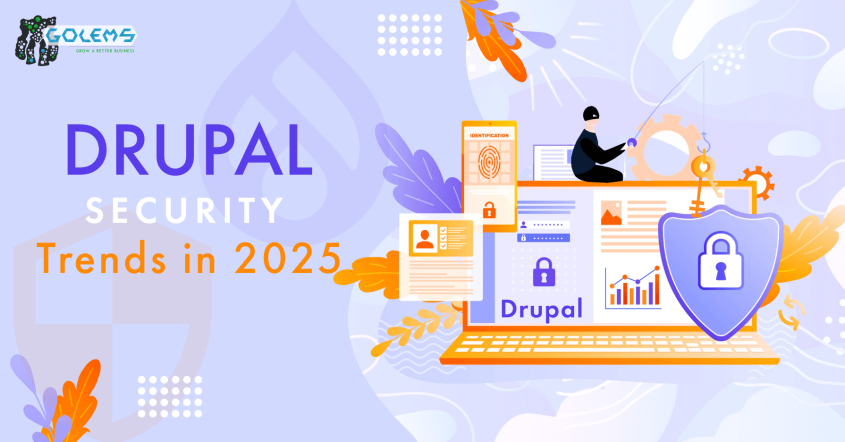Golems GABB: Drupal Security Trends in 2025: How to Protect Your Business
Technically, Drupal is one of the most secure open-source platforms out there. It has an active developer community, frequent patches, and a robust architecture. But the reality is that cyber threats aren’t slowing down even in 2025. If you still think updating modules is enough, that’s one of the biggest mistakes today.
Cybercriminals in 2025 are sharper than ever. Hacking a site used to take time previously. Now they need just a few minutes, especially when site owners overlook basic security. Drupal may be powerful and built for high traffic, but without proper setup and maintenance, it can be breached.
Drupal websites are attractive targets because of their popularity. Moreover, they’re widely used in complex B2B systems, government portals, and major media platforms. Exactly the kind of areas cybercriminals look for. Attackers aren’t chasing CMSs. They’re going after data, money, and access to infrastructure. In 2025, Drupal security is not about convenience or reputation. It’s about business continuity, compliance, and staying competitive.
There is a new class of threats, new legal risks, and an entirely different approach to architecture. It’s time to find out how the Drupal security landscape has changed and what needs to be done to avoid becoming the next target.
5 Common Vulnerabilities in Drupal Still Ignored
Back in the day, Drupal admins mostly dealt with things like XSS attacks and contact form exploits. Today, the attack surface has shifted and become far more sophisticated. Attackers use API phishing, malicious code injections in CI/CD pipelines, or library hijacking via Composer.
The Golems team is also seeing a rise in attacks targeting businesses. And it’s not just about finding weak spots in the code. Attackers are studying how your authentication flows, checkout processes, or CRM integrations work. This means security is no longer just a developer’s job; it’s a business responsibility too.
Most Drupal sites today use custom setups with extra modules and tools. If just one of them is outdated, it can put your whole site at risk.
Most Weak Points Hackers Exploit in 2025
If you're running a Drupal site in 2025, you need a clear, proactive security plan that covers the technical side and the wider business context of your online presence.
Drupal 11: New Security Features and How to Use Them Effectively
Drupal 11 has made significant progress in security. The platform now includes built-in 2FA, improved session control, cookie management, and better support for HTTP security headers.
However, simply upgrading to the latest core version won’t secure your site on its own. The platform provides tools, but it’s your responsibility to use them wisely.
Key Features You Should Start Implementing Today
- Regular audits can detect the vast majority of vulnerabilities before they cause damage. A full security audit should be performed at least twice a year. Even once a year is far better than never.
- A proper 2025 audit should include: solutions like reCAPTCHA v3 and Flood Control modules to reduce spam bots; encryption to transform sensitive information into unreadable content without the key.
- Encryption is no longer optional; it’s a standard, especially in finance, healthcare, and e-commerce. Recommended encryption practices for Drupal-based platforms:
Steps to Bring Your Drupal Site into GDPR Compliance
Some still believe that GDPR only applies to European businesses. That is incorrect. If even one of your consumers is an EU citizen, you are legally obligated to comply.
Enforcement is genuine; in 2023, Meta was fined €1.2 billion, the highest GDPR penalty to date. Steps to bring your Drupal site into GDPR compliance:
A Modern API Security Policy Should Cover
If you're still using “admin” and “a111111,” you're putting yourself at risk. One of the most underestimated ways to protect a Drupal site is through non-standard login credentials.
Today, attacks are fully automated, and login credentials are often cracked using brute force. A default username and a weak password can put your data and reputation at serious risk.
Drupal allows you to change the admin username directly from the control panel
Main Drupal Security Trend Is To Stay Safe In 2025 security is no longer just something your development team should worry about. Clients are asking the hard questions, regulators aren’t giving second chances, and your reputation is built or broken on how you handle data.
People choose to work with companies that treat data privacy not as a checkbox, but as a real commitment to security. Even if someone offers a lower price, strong protection can tip the scale in your favor.
Every technical decision, from how you write code to how you design your infrastructure, should stand up to scrutiny. Not because it’s trendy, but because it’s how you stay in business.
